|  
IN THE NEWS | FROM THE PUBLISHER | IN THE GARDEN | CALENDAR
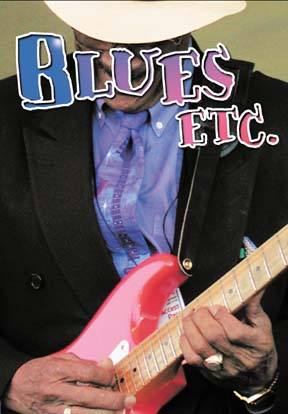
Blues by the Bay, Vol. VI
Schedule by BOB DORAN
EVERY SPRING AN ORGANIZATION IN MEMPHIS, TENN., the Blues Foundation, honors the country's top blues musicians with what are called the W. C. Handy Blues Awards. Named for "Father of the Blues" William Christopher Handy, who wrote classic tunes like "St. Louis Blues," the awards are the blues world's equivalent of the Grammys or the Oscars. The artists performing at Blues by the Bay Vol. VI this weekend have earned their fair share. Sunday's lineup includes a band called the W.C. Handy All Stars with Debbie Davies, Duke Robillard and Billy Boy Arnold, all Handy award winners and nominees. They will be followed by blues belter Shemekia Copeland, winner of the Handy award for "Best Contemporary Female Vocalist" two years running and Marcia Ball, who was nominated for five Handys this year and took one home for the "Album of the Year." The top of the bill Saturday at Blues by the Bay is Koko Taylor, a woman known as the "Queen of the Blues." Since the Blues Foundation began handing out Handys in 1980, Taylor has received 22, including 13 for "Contemporary Female Artist of the Year." This year, for the sixth time, she took home an award for "Traditional Female Artist of the Year." Queen of the Blues 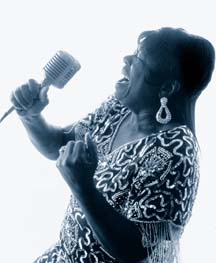 Koko Taylor sincerely believes the blues are in her blood. "I think I was born trying to sing the blues," she said in a phone interview from somewhere on the road. Koko Taylor sincerely believes the blues are in her blood. "I think I was born trying to sing the blues," she said in a phone interview from somewhere on the road.
Born to sharecropper parents in a small town outside of Memphis, Taylor grew up working in the fields. Her introduction to the blues was through WDIA, a Memphis radio station. She and her brothers had to sneak off to listen since her father allowed nothing at home but gospel. "Daddy said the blues was the devil's music," said Taylor. "We loved the blues, but he didn't know we were listening to it. That music on the radio, that was the beginning, that was the start. After that I knew what I wanted to listen to -- nothing but the blues." By the time Koko was 11, both her parents had died. She and her brothers bounced from one relative to another until they were old enough to fend for themselves. When she was 18, Koko met a guitar-playing truck driver, Robert "Pop" Taylor, who took her to Chicago where they married and found work. "I was working for some rich white family up on Chicago's North Shore -- taking care of their kids, washing, ironing, cleaning, cooking, doing everything. Pop worked for a packing company where they would slaughter cows and that sort of thing." Weekends they hit the town checking out Chicago's hot blues scene. "We would go to different clubs and my husband would tell them, `Yeah, my wife loves to sing the blues.' All of the guys got to know me and they'd call me up to do a number with them. I was sitting in one weekend with Howlin' Wolf and when I finished singing, here come this big man. He walks over to me and says, `My God, I never heard a woman sing the blues like you sing the blues. Where did you come from?' "I said, `Memphis, and who are you that wants to know?' He said, `Willie Dixon.' And he said, `What the world needs today is a woman like you to sing the blues. We've got plenty of men but no women.'" Dixon was a major mover in the Chicago scene, the writer of blues standards including "Little Red Rooster," "Back Door Man" and "Spoonful." "Wang Dang Doodle" was a song he wrote for Taylor. It became a major hit, enabling her to quit her housekeeping job, and it was her signature number when she began a career as a full-time musician. "That song went over so big and sold so many records. I was going all over the world. And I haven't slowed up since. I'm still singing the blues." Cajun Boogie Blues 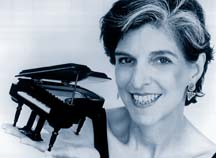 Marcia Ball grew up in Vinton, a small French Cajun town in southwestern Louisiana, "about 10 blocks by 10 blocks." Her family was Cajun, and music was part of daily life. Marcia Ball grew up in Vinton, a small French Cajun town in southwestern Louisiana, "about 10 blocks by 10 blocks." Her family was Cajun, and music was part of daily life.
"As a matter of fact, my grandmother played ragtime and accompanied the silent movies in Lafayette, La., when she was young. She left me a window box full of Tin Pan Alley sheet music and a head full of those old melodies," said Ball in a call from her home in Austin, Texas. "My aunt played popular music from the '40s and '50s, including boogie woogie, and my cousin and I had a friendly competition on who could learn the most. And a lot of that music was blues." As she grew older Marcia turned towards rock `n' roll. When she dropped out of Louisiana State University in the early '70s and headed west with her first husband, she landed in Austin and started playing country music. "But when it came time to write songs and go forward with my own music, the natural thing was for me to play what I grew up listening to -- and that was blues," she said. "I was fortunate to find a direction that worked for me, that worked for the instrument that I play." Ball has developed a piano style that draws on the boogie woogie she learned from her aunt along with hints of Texas blues and the unmistakable sound of New Orleans. "When people ask what kind of music I play, for simplicity sake I say `Blues.' But if it's more specific, I try to explain what New Orleans rhythm and blues is -- and I can't -- I just say, `You know, like Fats Domino.' And just about everyone will say, `Oh, I love Fats Domino.' It seems to be a style that appeals to a broad range of people. When I delved a little deeper, I discovered Professor Longhair [a legendary although obscure New Orleans piano player] and that made me realize there was a whole body of work I could explore and expand." While the music of New Orleans still plays a major role in her sound, her lyrics reflect the fact that she settled in Austin over 30 years ago. "When it comes to lyrics, the bar has been set high for songwriting here in Texas. So in addition to wanting to write my fun and funky melodies, I still want to portray a certain message too, and I want to say it well." Ball penned five of the 13 songs on her latest album, Presumed Innocent [the "album of the year" winner]. It shows an artist at the peak of her craft, dropping in boogie riffs, Cajun sounds, torch songs and plenty of blues. The Duke 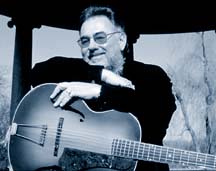 Guitarist Duke Robillard is a key figure in the second generation blues scene. Raised in Harrisville, R.I., "a little country town," Robillard discovered the blues when his older brother started bringing home rock `n' roll records in the mid-'50s. In a call from Canada where he was touring with his band, he recalled his mother's reaction to his intense interest in rock. Guitarist Duke Robillard is a key figure in the second generation blues scene. Raised in Harrisville, R.I., "a little country town," Robillard discovered the blues when his older brother started bringing home rock `n' roll records in the mid-'50s. In a call from Canada where he was touring with his band, he recalled his mother's reaction to his intense interest in rock.
"She didn't want me to have an electric guitar. Rock `n' roll was a new thing and it scared the hell out of her. My uncle finally got somebody to give me a beat-up acoustic one. A few years later I took the neck and some of the parts off it, and with my father built an electric guitar for a science project. I won second place -- and about a week later I was in a band." His interest in guitars and the blues continued unabated. In 1967, 19 years old and fresh out of high school, he founded a band called Roomful of Blues. He would lead the band for 12 years, exploring blues, rhythm and blues and jump swing before moving on to a solo career. Besides recording 17 albums under his own name, he has been a session player on scores of albums including Bob Dylan's Grammy-winning Time Out of Mind. "As far as my own recordings go, I tend to go back and forth between different aspects of the (blues) genre. My newest album, Living With the Blues, is all blues, but with many different styles: jump blues, Chicago-style blues, there's an acoustic tune. My guitar sound is definitely rooted in music that comes from the '40s and '50s. We cover a wide variety of styles, but I think I have my own voice in all of them." Robillard is also developing his own voice as a producer. "A lot of people I've been working with -- Jimmy Witherspoon, Roscoe Gordon, Ruth Brown, Jay McShann, Billy Boy Arnold -- are all people who have been idols of mine. When I was young, I never thought I would even meet them, never mind be in the studio producing them and playing with them." For the last three years Robillard, a two-time Handy winner, has led the W.C. Handy All Stars. "Basically it's the Duke Robillard Band backing up other artists who are also award winners or nominees," he explained. For Blues by the Bay the band will back Debbie Davies and Billy Boy Arnold, two artists whose most recent records were produced by Robillard. "Billie Boy Arnold is an early '50s Chicago blues artist, a great singer and a great harp player," said Robillard. "When he was very young he played harmonica with Bo Diddley and is on some of his famous recordings like `I'm a Man.' He also started recording his own singles in the '50s and had some hits. He did `I Ain't Got You,' which Eric Clapton recorded when he was with the Yardbirds. He wrote a lot of really great songs. In the last 10 years or so he's made a comeback, recording a few albums and doing dates. I produced his latest album, Boogie and Shuffle, which I think is a really strong Chicago blues album." Guitar Slinging Woman 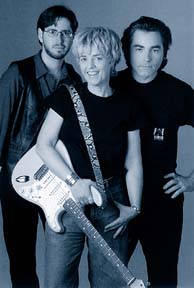 Debbie Davies started her professional music career at an early age, but she didn't start out playing the blues. When Davies was growing up in the San Fernando Valley, her father, Alan Davies, was a studio musician and vocal arranger in Los Angeles. Debbie sang at home and in the school chorus, and since dad sometimes needed kids to sing, Debbie ended up doing TV soundtracks, commercials and records. Hers is among the voices you hear in the "It's a Small World" exhibit at Disneyland. Debbie Davies started her professional music career at an early age, but she didn't start out playing the blues. When Davies was growing up in the San Fernando Valley, her father, Alan Davies, was a studio musician and vocal arranger in Los Angeles. Debbie sang at home and in the school chorus, and since dad sometimes needed kids to sing, Debbie ended up doing TV soundtracks, commercials and records. Hers is among the voices you hear in the "It's a Small World" exhibit at Disneyland.
How did she move from that into the blues? "With a great deal of rebellion, actually," said Davies in a call from her home in Connecticut. "Even though my parents were music types, they were pretty conservative; they weren't into much outside of classical and jazz. As the rock scene was coming on, most parents feared it for their kids. They figured if you started playing rock music you would become a delinquent and do drugs and alcohol -- which is basically true." After high school she headed north to attend Sonoma State University. She joined a blues band, not as a guitarist but as the singer. "I got an electric guitar and started doing it, but at that time the guys in the band would just kind of laugh at me. I realized if I wanted to play, I would have to run my own band. So I quit, took one of the guitar players with me and started a new band." Ten years later, in 1984, after playing in a string of blues bands around the Bay Area, Davies moved back to Los Angeles. "As it turned out there was a flourishing blues scene in L.A. at that time. Blues artists like Albert Collins and John Mayall and Bonnie Raitt lived there when they weren't on the road. I met everybody." Among those she met was Maggie Mayall, John's wife. She was putting together an all-women blues band to open for her husband on tour and Davies got the gig. "That led to a romance with one of John's guitar players, Coco Montoya. We lived together for a while -- it was just the blues household. And through Coco, I met Albert Collins." The timing was right. Collins, known as "the Master of the Telecaster," was heading out on tour and was in need of a second guitarist. "With Maggie Mayall we were writing songs trying to get a record deal, the whole thing. We were just a little bit ahead of our time as far as the record industry was concerned. There weren't too many women signed at the time. Albert was kind of knocked out by what I was doing." While female vocalists have been a constant, a woman guitar slinger was a still a rarity. Collins didn't care. He took Davies out on the road and took her under his wing. "It was wonderful. I worked with him for three years. I got to tour with him and cut an album with him." Then it was time to do her own thing -- and Davies hasn't let up since. A decade and eight albums later, and she's at the top of her game, nominated (along with Marcia Ball and Shemekia Copeland) for a 2002 Handy for "Contemporary Female Blues Artist of the Year." Queens of Etc. 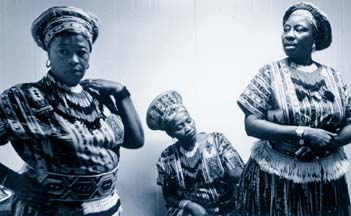 The major change-up in Saturday's lineup is a shift into music that has absolutely no connection to the blues. And chances are the Mahotella Queens will steal the show. The trio of grandmothers from South Africa are pioneers of a music known as mbaquanga, township jive or, in the title of an album that brought the music to America, The Indestructible Beat of Soweto. The major change-up in Saturday's lineup is a shift into music that has absolutely no connection to the blues. And chances are the Mahotella Queens will steal the show. The trio of grandmothers from South Africa are pioneers of a music known as mbaquanga, township jive or, in the title of an album that brought the music to America, The Indestructible Beat of Soweto.
"Mbaquanga is a Zulu word for a special bread," explained Hilda Tloubatla, one of the Queens, in a call from a California motel. "In the olden days our grandmothers used to bake this special bread made out of ground white beans and dried corn we called mele-meal. That concoction they called mbaquanga. Our music is made out of a lot of different rhythms and different musics. We sing in all the nine languages of our country, hence we called the music mbaquanga." In the early 1960s Tloubatla, Mildred Mangxola and Nobesuthu Mbadu were dubbed the Mahotella Queens by record producer Rupert Bopape, who hired them as back-up singers for Simon Nkabindé Mahlathini, a gravel-voiced singer known as the "Lion of Soweto." They were backed by a lively band with a ringing guitar sound, the Makgona Tsothle Band, "The Band Who Knows Everything." According to Tloubatla, in the beginning mbaquanga was mostly based on traditional South African wedding songs. "During those days we would never sing about politics. You would be arrested or something worse would happen to you. Our songs in those days used to be censored before they could play them over the air. We would sing about love." Despite the fact that their country was going through hard times, the music expressed a joy that helped ease the pain of the struggle with apartheid. "We got used to it. There was nothing else we could do," said Tloubatla. "Just sitting there crying in pain didn't help. We just said to ourselves, `Well we are born in this country with this kind of situation. We are going to live with it and make ourselves happy.'" A lot of things have changed since freedom came to South Africa when apartheid ended. "Now you are allowed, you can compose a song to talk about politics or whatever. In most cases we compose our lyrics based on what is happening in daily life." The Queens' latest album, Sebai Bai, includes a song called "Masibambaneni" addressing the situation in their homeland. "It says, `Let's come together. Let's hold hands, both black and white. Let's be together.' It's a hope for the future of our country." And how will the Queens' mbaquanga fit in with a blues festival? "Our music is totally different, so it will be like cooling off your mind from the blues as you get into our rhythms. You will say, `My God, something new. This is good music!'" Blues Princess 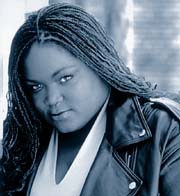 A lot of people say they were born to sing the blues. Shemekia Copeland can back up the claim. Her father was the late great Texas blues guitarist Johnny Copeland. When she was 8 years old he dragged her up on stage to sing with him at the Cotton Club in Shemekia's home town, Harlem -- and she had the pipes to do it. A lot of people say they were born to sing the blues. Shemekia Copeland can back up the claim. Her father was the late great Texas blues guitarist Johnny Copeland. When she was 8 years old he dragged her up on stage to sing with him at the Cotton Club in Shemekia's home town, Harlem -- and she had the pipes to do it.
By the time she was 16, her father had been diagnosed with a heart condition and his health was beginning to fail. He began taking Shemekia on the road with him and she belted out the blues, opening and sometimes stealing the show. In 1998, when she was 20, the year after her father died, Shemekia released Turn the Heat Up, her first album for Alligator Records. Wicked followed in 2001. This year Shemekia took home the Handy for "Contemporary Female Artist of the Year," an award she also won last year, along with awards for "Song of the Year" and "Album of the Year" for her Wicked disc. Her music shows an artist with her own unique sound -- and a dedication to her blues heritage. "I listen to Koko Taylor, Katie Webster, Trudy Lynn, Etta James. But I don't try to copy them," said Shemekia in an interview for the Handy Awards. "I just take little things from each one and add them to my style. But for as long as I live my father's music will live through me. I feel his spirit on stage every night. As long as I'm here, the blues will always be in me and I'm gonna be spreading it around the world. I'm going to keep on doing this and make my daddy proud."
Blues, funk, swing, brass blues, etc. 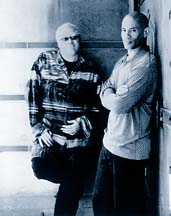 WHEN THE BONESHAKERS [photo at right] AMAZED THE CROWD AT Blues by the Bay Vol. 2 back in 1998, the band, a spin-off from Don Was' project, Was (Not Was), had just released it's second album. Not long after that, vocalist Sweet Pea Atkinson and guitarist Randy Jacobs parted ways. Now the band is born again for more rock solid funk and blues, this time with vocalist Malford Milligan. Born in Austin, Milligan also sings with a resurrected version of Double Trouble featuring Chris Layton and Tommy Shannon, two-thirds of Stevie Ray Vaughan's awesome power trio. WHEN THE BONESHAKERS [photo at right] AMAZED THE CROWD AT Blues by the Bay Vol. 2 back in 1998, the band, a spin-off from Don Was' project, Was (Not Was), had just released it's second album. Not long after that, vocalist Sweet Pea Atkinson and guitarist Randy Jacobs parted ways. Now the band is born again for more rock solid funk and blues, this time with vocalist Malford Milligan. Born in Austin, Milligan also sings with a resurrected version of Double Trouble featuring Chris Layton and Tommy Shannon, two-thirds of Stevie Ray Vaughan's awesome power trio.
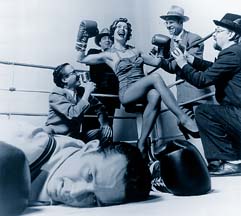 Steve Lucky and the Rhumba Bums [photo at left] return to Eureka after making a splash at the Dixieland festival a couple of years back. And no, they are not a Cuban band. Guitar-playing lead singer Miss Carmen Getit's retro outfits and a horn section and upright bass might suggest swing or neo-swing, but according to bandleader/piano man Steve Lucky, the Bums play the blues, specifically jump blues. Steve Lucky and the Rhumba Bums [photo at left] return to Eureka after making a splash at the Dixieland festival a couple of years back. And no, they are not a Cuban band. Guitar-playing lead singer Miss Carmen Getit's retro outfits and a horn section and upright bass might suggest swing or neo-swing, but according to bandleader/piano man Steve Lucky, the Bums play the blues, specifically jump blues.
In a call from his Oakland home, Lucky explained: "While a lot of the neo-swing bands came out of rock 'n' roll or were even punk musicians, I come from a blues background. [Lucky played keys for Johnny Copeland for years.] And half of the band are stone jazz musicians. Musically that sets us apart. Then you've got Carmen and me up there making fools of ourselves doing duets and lots of `repartee,' as they say. Musically we take ourselves seriously, but we like to have fun. It's humorous at times; I like to think so anyway." 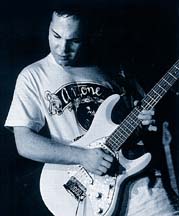 The 20-year-old blues guitar whiz Corby Yates [photo at right] has been tearing it up Hendrix/Stevie Ray Vaughn-style since he was 14. In a call from his home in Santa Cruz, Yates said that his musical education began when he was 6. The 20-year-old blues guitar whiz Corby Yates [photo at right] has been tearing it up Hendrix/Stevie Ray Vaughn-style since he was 14. In a call from his home in Santa Cruz, Yates said that his musical education began when he was 6.
"My dad played guitar a lot and he had guitars around the house. I'd play around and strum on them. I loved Led Zeppelin. I wanted to hear them all the time and to play their songs." Yates took lessons briefly in sixth grade, but learned more by listening to his heroes. "I've got this little machine. It's called a Rock 'n' Play, you can switch it to half speed and hear the records that way. I'd slow down the songs and figure them out note by note." His debut record, Corby Yates, was released late last year. It mixes blues, rock and funk on a combination of originals and covers. Yates sees it as the next step toward making the blues his permanent career. "I just want to see how far it will take me and keep having fun doing it," he said. "Music has always been something I like to do; it works out good being able to make money doing what I want." The concept behind the Brass Money Brass Band was simple: assemble a New Orleans-style brass band, a la the Dirty Dozen, for a San Francisco Mardi Gras party. A tuba player and a couple of percussionists capable of playing on their feet make up the rhythm section. Saxes, trombones and a trumpet player provide the rest of the brass. The repertoire ranges from New Orleans classics to covers of Led Zeppelin and Stevie Wonder. The idea stuck, good times and good music ensued. Karen Dumont, leader of the Arcata Interfaith Gospel Choir and a blues and jazz powerhouse in her own right, returns to Blues by the Bay for the second year in a row, with sets both Saturday and Sunday. It's a busy weekend for Dumont. She's also singing at Saffire Rose Thursday night and at the Eureka Inn Friday night. Friends of the singer Lesa Katani gathered last Tuesday night at the Bayside Grange for a joyous wake in her memory. Katani's band, Bliss Cookie, was supposed to open the show Saturday at Blues by the Bay. Instead the Double Downs, a band put together by guitarist Andy Widman, will offer a tribute to Lesa. Blues by the Bay, Volume VI Waterfront Park, foot of L St., Eureka, Calif. | SATURDAY, JULY 13 11:15 a.m. The Double Downs tribute to Lesa Katani Noon. The Boneshakers 1:15 p.m. Karen Dumont and the Bluelight Special 2:20 p.m. Mahotella Queens 3:35 p.m. Brass Monkey Brass Band 4:40 p.m. Koko Taylor and Her Blues Machine | SUNDAY, JULY 14 11:15 a.m. Karen Dumont and the Bluelight Special Noon. W.C. Handy All Stars featuring the Duke Robillard Band with Debbie Davies and Billy Boy Arnold 1:15 p.m. Corby Yates 2:20 p.m. Shemekia Copeland 3:35 p.m. Steve Lucky and the Rhumba Bums 4:40 p.m. Marcia Ball | Admission is $25 a day, $40 for both days.
Two-day youth ticket for those 13-20 is $25; 12 and under free.
Call Redwood Coast Festivals at 445-3378 for further information or go to
www.bluesbythebay.org Presented by Redwood Coast Music Festivals - 445-3378
No coolers, cans, bottles or pets, please.
IN THE NEWS | FROM THE PUBLISHER | IN THE GARDEN | CALENDAR Comments? E-mail the Journal: [email protected] 
© Copyright 2002, North Coast Journal, Inc. | 

 Koko Taylor sincerely believes the blues are in her blood. "I think I was born trying to sing the blues," she said in a phone interview from somewhere on the road.
Koko Taylor sincerely believes the blues are in her blood. "I think I was born trying to sing the blues," she said in a phone interview from somewhere on the road. Marcia Ball grew up in Vinton, a small French Cajun town in southwestern Louisiana, "about 10 blocks by 10 blocks." Her family was Cajun, and music was part of daily life.
Marcia Ball grew up in Vinton, a small French Cajun town in southwestern Louisiana, "about 10 blocks by 10 blocks." Her family was Cajun, and music was part of daily life. Guitarist Duke Robillard is a key figure in the second generation blues scene. Raised in Harrisville, R.I., "a little country town," Robillard discovered the blues when his older brother started bringing home rock `n' roll records in the mid-'50s. In a call from Canada where he was touring with his band, he recalled his mother's reaction to his intense interest in rock.
Guitarist Duke Robillard is a key figure in the second generation blues scene. Raised in Harrisville, R.I., "a little country town," Robillard discovered the blues when his older brother started bringing home rock `n' roll records in the mid-'50s. In a call from Canada where he was touring with his band, he recalled his mother's reaction to his intense interest in rock. Debbie Davies started her professional music career at an early age, but she didn't start out playing the blues. When Davies was growing up in the San Fernando Valley, her father, Alan Davies, was a studio musician and vocal arranger in Los Angeles. Debbie sang at home and in the school chorus, and since dad sometimes needed kids to sing, Debbie ended up doing TV soundtracks, commercials and records. Hers is among the voices you hear in the "It's a Small World" exhibit at Disneyland.
Debbie Davies started her professional music career at an early age, but she didn't start out playing the blues. When Davies was growing up in the San Fernando Valley, her father, Alan Davies, was a studio musician and vocal arranger in Los Angeles. Debbie sang at home and in the school chorus, and since dad sometimes needed kids to sing, Debbie ended up doing TV soundtracks, commercials and records. Hers is among the voices you hear in the "It's a Small World" exhibit at Disneyland. The major change-up in Saturday's lineup is a shift into music that has absolutely no connection to the blues. And chances are the Mahotella Queens will steal the show. The trio of grandmothers from South Africa are pioneers of a music known as mbaquanga, township jive or, in the title of an album that brought the music to America, The Indestructible Beat of Soweto.
The major change-up in Saturday's lineup is a shift into music that has absolutely no connection to the blues. And chances are the Mahotella Queens will steal the show. The trio of grandmothers from South Africa are pioneers of a music known as mbaquanga, township jive or, in the title of an album that brought the music to America, The Indestructible Beat of Soweto. A lot of people say they were born to sing the blues. Shemekia Copeland can back up the claim. Her father was the late great Texas blues guitarist Johnny Copeland. When she was 8 years old he dragged her up on stage to sing with him at the Cotton Club in Shemekia's home town, Harlem -- and she had the pipes to do it.
A lot of people say they were born to sing the blues. Shemekia Copeland can back up the claim. Her father was the late great Texas blues guitarist Johnny Copeland. When she was 8 years old he dragged her up on stage to sing with him at the Cotton Club in Shemekia's home town, Harlem -- and she had the pipes to do it. WHEN THE BONESHAKERS [photo at right] AMAZED THE CROWD AT Blues by the Bay Vol. 2 back in 1998, the band, a spin-off from Don Was' project, Was (Not Was), had just released it's second album. Not long after that, vocalist Sweet Pea Atkinson and guitarist Randy Jacobs parted ways. Now the band is born again for more rock solid funk and blues, this time with vocalist Malford Milligan. Born in Austin, Milligan also sings with a resurrected version of Double Trouble featuring Chris Layton and Tommy Shannon, two-thirds of Stevie Ray Vaughan's awesome power trio.
WHEN THE BONESHAKERS [photo at right] AMAZED THE CROWD AT Blues by the Bay Vol. 2 back in 1998, the band, a spin-off from Don Was' project, Was (Not Was), had just released it's second album. Not long after that, vocalist Sweet Pea Atkinson and guitarist Randy Jacobs parted ways. Now the band is born again for more rock solid funk and blues, this time with vocalist Malford Milligan. Born in Austin, Milligan also sings with a resurrected version of Double Trouble featuring Chris Layton and Tommy Shannon, two-thirds of Stevie Ray Vaughan's awesome power trio. Steve Lucky and the Rhumba Bums [photo at left] return to Eureka after making a splash at the Dixieland festival a couple of years back. And no, they are not a Cuban band. Guitar-playing lead singer Miss Carmen Getit's retro outfits and a horn section and upright bass might suggest swing or neo-swing, but according to bandleader/piano man Steve Lucky, the Bums play the blues, specifically jump blues.
Steve Lucky and the Rhumba Bums [photo at left] return to Eureka after making a splash at the Dixieland festival a couple of years back. And no, they are not a Cuban band. Guitar-playing lead singer Miss Carmen Getit's retro outfits and a horn section and upright bass might suggest swing or neo-swing, but according to bandleader/piano man Steve Lucky, the Bums play the blues, specifically jump blues. The 20-year-old blues guitar whiz Corby Yates [photo at right] has been tearing it up Hendrix/Stevie Ray Vaughn-style since he was 14. In a call from his home in Santa Cruz, Yates said that his musical education began when he was 6.
The 20-year-old blues guitar whiz Corby Yates [photo at right] has been tearing it up Hendrix/Stevie Ray Vaughn-style since he was 14. In a call from his home in Santa Cruz, Yates said that his musical education began when he was 6.